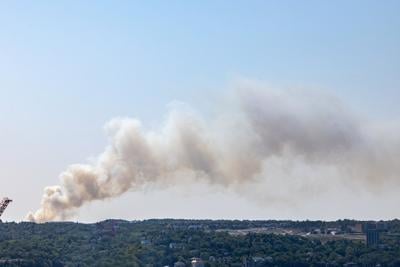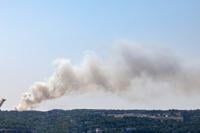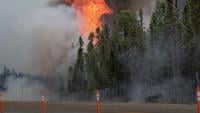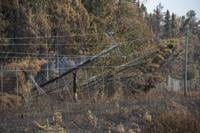HALIFAX - A pilot was rescued Friday after a helicopter with Nova Scotia's Department of Natural Resources crashed in shallow water while helping with firefighting efforts.
Other firefighters in the area quickly reached the downed aircraft in Annapolis County, N.S., and found the pilot conscious, said a news release from the department.
The pilot was the sole person on board the aircraft and he was talking to the other firefighters and taken for medical assessment, the release said.
"Relieved to hear that the pilot involved in the helicopter crash near Halifax is safe and receiving care," said Eleanor Olszewski, the federal minister of emergency management, in a social media post. "The aircraft was supporting wildfire efforts in Nova Scotia. We’re grateful for their service and wish them a full and speedy recovery."
Nova Scotia Premier Tim Houston also posted a message wishing the pilot a quick recovery.
"Thank you to everyone who responded so quickly to reach the aircraft and provide support," Houston wrote.
The helicopter crashed while fighting the Long Lake fire, which has been burning out of control since Wednesday in the Annapolis Valley. The fire grew from three to four square kilometres in the past two days, forcing the evacuation of about 100 homes in the heavily wooded West Dalhousie area, about 125 kilometres west of Halifax.
Officials said the crash occurred just before 4:30 p.m. local time. The Department of Natural Resources said it would not release the pilot's name, out of respect for his privacy.
Transport Canada has been informed about the incident, the department said.
A spokesperson with the Joint Rescue Coordination Centre in Halifax said a Cormorant helicopter was dispatched to the scene to help out.
The crash came after fire officials said Friday they were concerned new wildfires could be ignited in the days ahead after thunderstorms rolled across the province Thursday night and into the morning.
Forest protection director Jim Rudderham said lightning can penetrate deep into the ground.
"The layers right down through the soil are very dry," he told a virtual briefing. "Lightning has a lot of power. It could drive into the ground and take some time to work its way back out again with fire .... It might take a while to pop up. "
Rudderham said that’s bad news for a province that was already dealing with 11 wildfires.
Rudderham said provincial officials asked for help on Thursday from water bombers in another province, but those aircraft could not make it to Nova Scotia because of the long line of thunderstorms. The availability of water bombers has been stretched thin because of the ongoing wildfires across Atlantic Canada, he said.
However, on Friday afternoon, the Natural Resources Department said that two CL-415 water bombers from Quebec had started working on the Long Lake fire in Annapolis County at 3:30 p.m.
Dave Steeves, a spokesman for the department, said the helicopters Nova Scotia uses to extinguish fires work well.
"I've been a professional firefighter for over 20 years now and the helicopter resources that we have are extremely effective," he said. "We have a group of very talented pilots."
Rudderham agreed.
"The vast majority of our wildfires are easily contained by the machines we have," he said. "Remember, this is an extreme year where all the agencies are busy right now, but we continue to investigate and look at options to see what's best for us."
While the thunderstorms dumped rain on some areas, it wasn't enough to reduce the risk of more wildfires, Rudderham said.
“We’ll take any kind of moisture," he said. "But it’s very dry out there and it wasn’t enough to help us."
Steeves said milder temperatures and higher humidity was helping firefighters, but “we’re still dealing with a relatively explosive situation.”
The Halifax Regional Municipality confirmed Friday night that a fire near Susies Lake, on the outskirts of the city, is now under control.
This report by ��ɫtvwas first published Aug. 15, 2025.
Note to readers:This is a corrected story. A previous version referred to Annapolis County, N.L., instead of N.S.














































